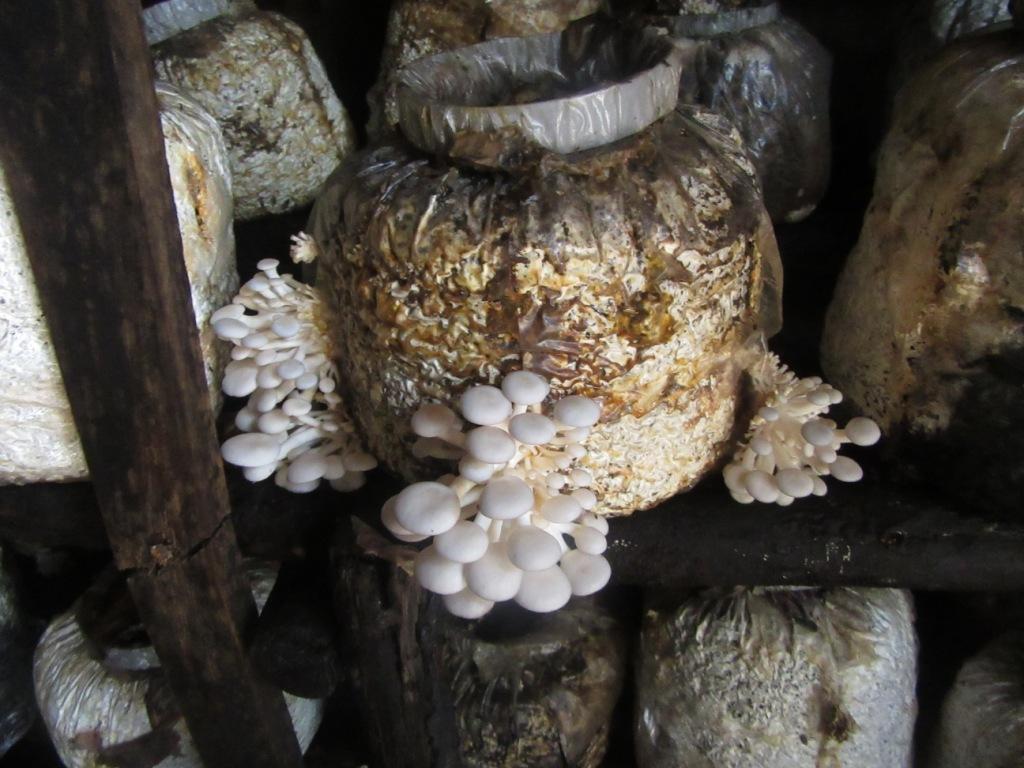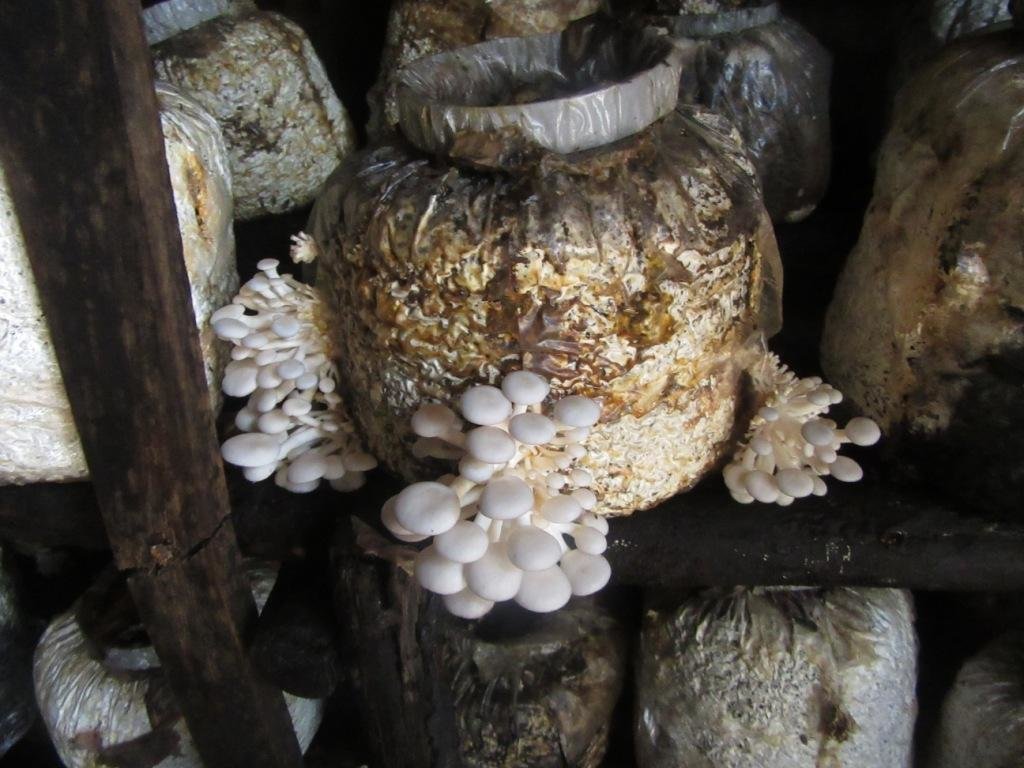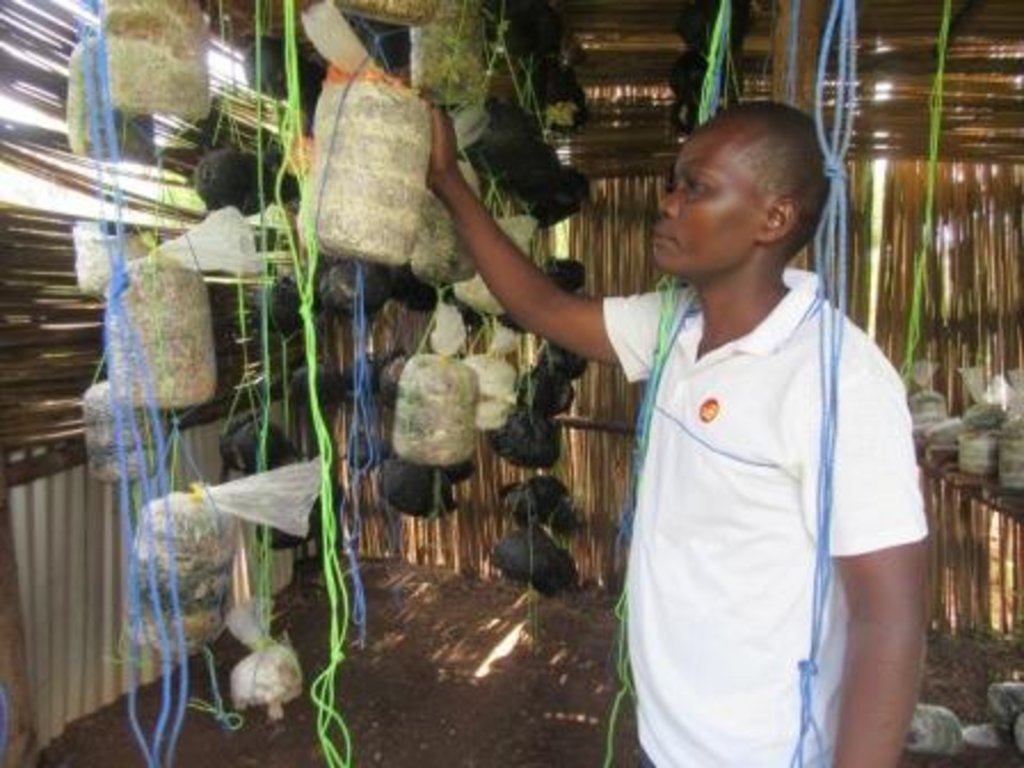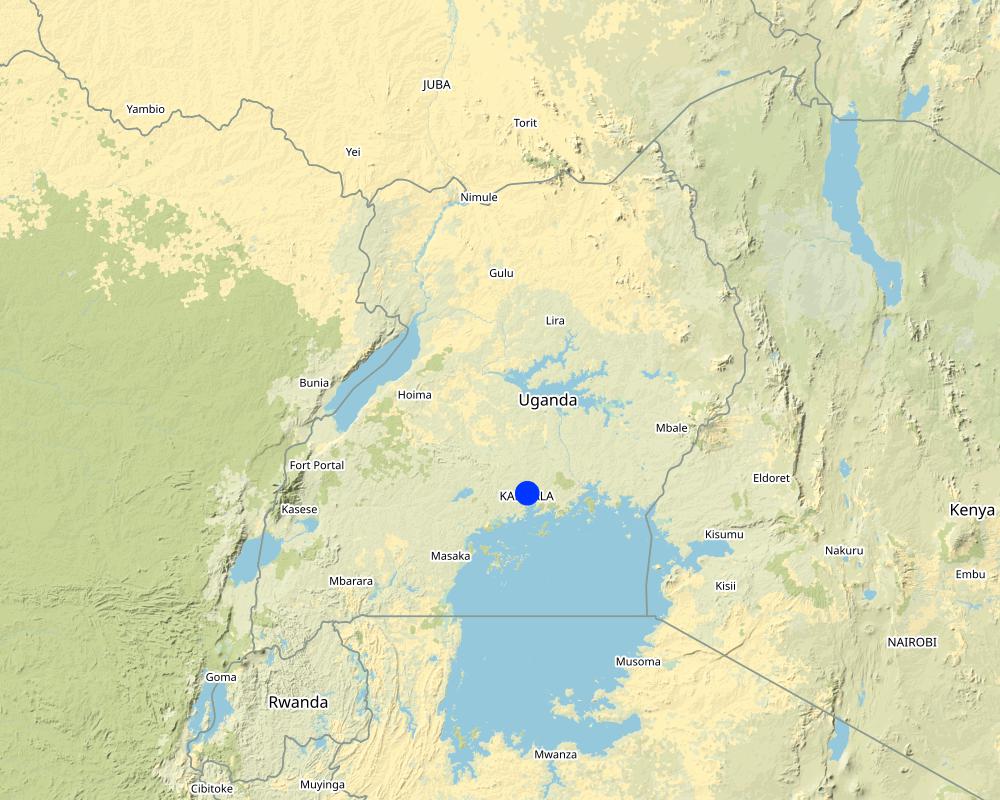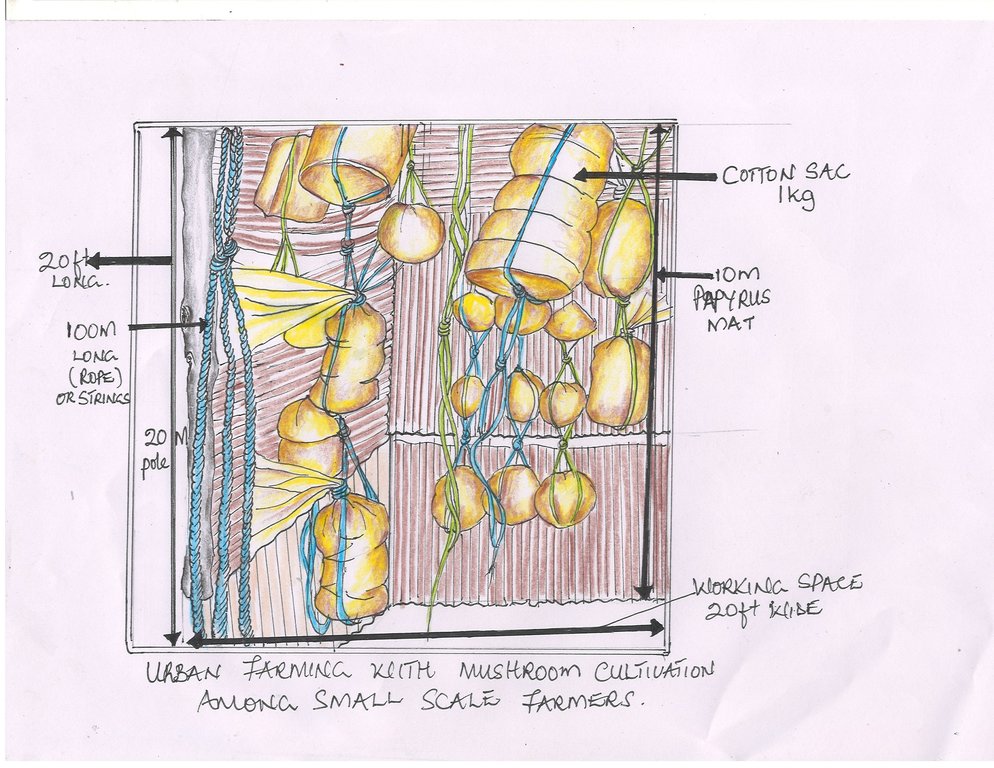Urban Farming with Mushroom Cultivation among Smallholder Farmers. [អ៊ូហ្គង់ដា]
- ការបង្កើត៖
- បច្ចុប្បន្នភាព
- អ្នកចងក្រង៖ Sarah Babirye
- អ្នកកែសម្រួល៖ Jalia Namakula, Kamugisha Rick Nelson
- អ្នកត្រួតពិនិត្យច្រើនទៀត៖ Nicole Harari, Udo Höggel
Okulima obutiko
technologies_3450 - អ៊ូហ្គង់ដា
ពិនិត្យមើលគ្រប់ផ្នែក
ពង្រីកមើលទាំងអស់ បង្រួមទាំងអស់1. ព័ត៌មានទូទៅ
1.2 ព័ត៌មានលម្អិតពីបុគ្គលសំខាន់ៗ និងស្ថាប័នដែលចូលរួមក្នុងការវាយតម្លៃ និងចងក្រងឯកសារនៃបច្ចេកទេស
បុគ្គលសំខាន់ម្នាក់ (ច្រើននាក់)
អ្នកប្រើប្រាស់ដី:
Grace Komuhangi
0782524325
Kamyokya farmers group
Kamyokya, Kisenyi Kampala
អ៊ូហ្គង់ដា
ឈ្មោះគម្រោងដែលបានចងក្រងឯកសារ/ វាយតម្លៃលើបច្ចេកទេស (បើទាក់ទង)
Scaling-up SLM practices by smallholder farmers (IFAD)ឈ្មោះអង្គភាពមួយ (ច្រើន) ដែលបានចងក្រងឯកសារ/ វាយតម្លៃបច្ចេកទេស (បើទាក់ទង)
National Agricultural Research Organisation (NARO) - អ៊ូហ្គង់ដា1.3 លក្ខខណ្ឌទាក់ទងទៅនឹងការប្រើប្រាស់ទិន្នន័យដែលបានចងក្រងតាមរយៈ វ៉ូខេត
តើពេលណាដែលទិន្នន័យបានចងក្រង (នៅទីវាល)?
12/5/2017
អ្នកចងក្រង និង(បុគ្គលសំខាន់ៗ)យល់ព្រមទទួលយកនូវលក្ខខណ្ឌនានាទាក់ទងទៅនឹងការប្រើប្រាស់ទិន្នន័យដែលបានចងក្រងតាមរយៈវ៉ូខេត:
បាទ/ចា៎
1.4 សេចក្តីប្រកាសស្តីពីចីរភាពនៃការពណ៌នាពីបច្ចេកទេស
តើបច្ចេកទេសដែលបានពណ៌នានេះមានបញ្ហាដែលផ្តោតលើការធ្លាក់ចុះគុណភាពដី, បើដូច្នេះវាមិនអាចត្រូវបានប្រកាសថាជាបច្ចេកទេសនៃការគ្រប់គ្រងប្រកបដោយចីរភាពទេ?
ទេ
មតិយោបល់:
The technology is not problematic with regard to land degradation.
2. ការពណ៌នាពីបច្ចេកទេស SLM
2.1 ការពណ៌នាដោយសង្ខេបពីបច្ចេកទេស
និយមន័យបច្ចេកទេស:
Mushroom (agaricus bisporus) cultivation is one of the profitable technologies promoted by small and medium scale farmers in urban setting fetching good returns on investment within a period of 30 days with the aim of obtaining tremendous nutritional benefits, employment and additional income gained by both farmers and suppliers of raw materials thus supporting the local economy and contributing to subsistence food security.
2.2 ការពណ៌នាលម្អិតពីបច្ចេកទេស
ការពណ៌នា:
Mushroom cultivation is a preferred and promoted technology by small and medium scale farmers with less land holdings. The technology has the portential to generate considerable nutritional benefits, employment and additional income which, in return, is invested in sustainable land management practices. To date, the demand for mushrooms increases as the result of a fast population growth having less income and food supply. Hence, a growing number of farmers adopt the mushroom production technology.
To establish such a technology, materials required include: cotton, a metallic drum (100 litres), a gunny bag of the size of 100kg, water, tarpuline, lime/maize brand, polyethene bags, banana leaf stock, cooking stove, firewood, mushroom seeds, tooth picks/nails and strings of approx. 100m length.
Listed below are the activities / procedures required for the establishment of a mushroom cultivation in a homestead.
-Water-soak the cotton into the drum and cover the drum with a gunny bag
-Remove the water out of the drum. The soaked cotton remains in the drum for around 2 hours
-Remove the soaked cotton on to a taurpline sheet and mix it with cultural lime/rice brand /maze brand that is placed on the taurpline
-Get black polythene bags and pack 1 kg of cotton into each polythene bag
-Place the banana leaf stock at the bottom of the drum and fill it with 20 litres of water
-Cut the gunny bag in the middle and cover the inside part of the drum to prevent burning of the cotton in the polythene bags while boiling
-Place the cotton in polythene bags into the drum and put the drum on the cooking stove to heat. The first line of polythene bags should be bent to prevent boiling water to enter the cotton
-Cover the drum tight with gunny bags
-Steam for around 2 hours
-Remove the firewood to cool until the next day
-Then remove the cooled cotton and place it on the tarpuline
-Buy mushroom seeds, smash the seeds (i.e, one pack of seeds mixes 2 gardens)
-Each kg of cotton mixed containing the mushroom seeds should be squeezed into the black polythene bags in a ball shape and tied on top
-Then get a tooth pick or a nail and pinch down 3 to 4 holes for air to come out
-Tie strings to the packed polythene bags and hang them for 14 days. (Strings enable sprouting on the gardens from all sides). Having moderate light, water needs to be applied twice a day or thrice in case of dry season during a period of 3 weeks
-After 7 days, the mushrooms start sprouting
-Leave the mushroom on the garden for 2-3 days before harvesting
-Once mushrooms are ripe, get a sharp knife and cut the stem carefully
On harvesting, the first week yields 8 Kg every second day, thereafter 3 kg of mushrooms every second day during the second month. Drums can be replaced every after 4 months so that the cost of maintenance is kept relatively low.
Mushrooms are a source of nutrients and proteins (Protein content, 3-7% when fresh and 25- 40% when dry). They are useful in preventing diseases and have medicinal values. Environmentally, the growing of mushrooms reduces pollution through bio-conservation and improves on crop production since harvested manure from the used mushroom ‘garden’ can be recycled as fertilizers for vegetable gardens at homes.
Despite the advantages, the technology faces various challenges: These include lack of a workplace (physical facility), lack of finance and skills on hygiene and sterilization, compost preparation, market challenges that include instability and decrease in sales prices of the products and inputs. Environmental factors like humidity, Ph, light and ventilation if not controlled may influence the growing process. Insects, diseases and animals due to the enclosed environment in which the mushrooms grow are a high risk. This may result in disease infestations like snails infestation.
However, maintenance costs of this technology are cheaper compared to establishment costs with minimum costs required for replacing worn out poles, replacing drums which can be at least every after 5 months.
2.3 រូបភាពនៃបច្ចេកទេស
2.4 វីដេអូនៃបច្ចេកទេស
ទីតាំង:
Kamwokya, Kisenyi/Kampala
ឈ្មោះអ្នកថតវីឌីអូ:
Babirye Sarah
2.5 ប្រទេស/តំបន់/ទីតាំងកន្លែង ដែលបច្ចេកទេសត្រូវបានអនុវត្ត និងបានគ្រប់ដណ្តប់ដោយការវាយតម្លៃនេះ
ប្រទេស:
អ៊ូហ្គង់ដា
តំបន់/រដ្ឋ/ខេត្ត:
Kampala
បញ្ជាក់បន្ថែមពីលក្ខណៈនៃទីតាំង:
Kamwokya, Kisenyi
Map
×2.6 កាលបរិច្ឆេទនៃការអនុវត្ត
ប្រសិនបើមិនច្បាស់ឆ្នាំ សូមបញ្ជាក់កាលបរិច្ឆេទដែលប្រហាក់ប្រហែល:
- តិចជាង 10ឆ្នាំមុន (ថ្មី)
2.7 ការណែនាំពីបច្ចេកទេស
- A friend
មតិយោបល់ (ប្រភេទនៃគម្រោង ។ល។):
Manure harvested from used up mushroom gardens is used as fertilizers in vegetable gardens.
3. ចំណាត់ថ្នាក់នៃបច្ចេកទេស SLM
3.1 គោលបំណងចម្បង (១ ឬច្រើន) នៃបច្ចេកទេសនេះ
- ធ្វើឱ្យប្រសើរឡើងនូវផលិតកម្ម
- បង្កើតផលប្រយោជន៍សេដ្ឋកិច្ច
- បង្កើតផលប្រយោជន៍សង្គម
3.2 ប្រភេទដីប្រើប្រាស់មួយប្រភេទ (ច្រើនប្រភេទ) ដែលបានអនុវត្តបច្ចេកទេស
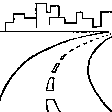
លំនៅដ្ឋាន ហេដ្ឋារចនាសម្ព័ន្ធ
- ដីលំនៅស្ថាន អគារ
3.3 ព័ត៌មានបន្ថែមអំពីអ្នកប្រើប្រាស់ដី
មតិយោបល់:
The technology is practiced in buildings hence it doesn't require water from the rain or any irrigation source.
ចំនួនសារដែលដាំដំណាំក្នុងមួយឆ្នាំ:
- 1
សូមបញ្ជាក់:
Once a month, so 12 seasons in a year
3.4 ក្រុម SLM ដែលបច្ចេកទេសស្ថិតនៅក្នុង
- គេហសួន
3.5 ការសាយភាយនៃបច្ចេកទេស
បញ្ជាក់ពីការសាយភាយនៃបច្ចេកទេស:
- អនុវត្តនៅកន្លែងជាក់លាក់មួយ/ ប្រមូលផ្តុំនៅតំបន់តូចៗ
មតិយោបល់:
Mushroom are grown on a small area.
3.6 វិធានការ SLM ដែលបញ្ចូលនូវបច្ចេកទេស

វិធានការផ្សេងៗ
មតិយោបល់:
Indoor mushroom cultivation. Residues from the gardens on which mushrooms grow can be recycled for fertilizers which can later be applied onto lands or homestead gardens to improve on soil fertility.
3.7 កំណត់ប្រភេទនៃការធ្លាក់ចុះគុណភាពដីសំខាន់ៗដែលបច្ចេកទេសនេះបានដោះស្រាយ

ផ្សេងៗ
3.8 ការពារ កាត់បន្ថយ ឬស្តារឡើងវិញនៃការធ្លាក់ចុះគុណភាពដី
បញ្ជាក់ពីគោលដៅរបស់បច្ចេកទេស ដែលផ្តោតទៅការធ្លាក់ចុះគុណភាពដី:
- ដែលមិនអាចអនុវត្តបាន
4. បច្ចេកទេសជាក់លាក់ សកម្មភាពអនុវត្ត ធាតុចូល និងថ្លៃដើម
4.1 គំនូសបច្ចេកទេសនៃបច្ចេកទេសនេះ
4.2 លក្ខណៈពិសេសនៃបច្ចេកទេស/ ពណ៌នាពីគំនូរបច្ចេកទេស
The technical drawing shows the mushroom technology with the following dimensions and inputs required for establishment; a working place (room) of 20 feet long *20 feet wide
One timber of 10 m long length, one tarpaulin of 20 m length *20 m width, strings/ropes of 100m length in total, 10m papyrus mats (2) , polythene bags (of 1 kg ), nails (2 kgs), one drum and 5 bags of cement and 20 gardens.
4.3 ព័ត៌មានទូទៅដែលពាក់ព័ន្ធនឹងការគណនាធាតុចូល និងថ្លៃដើម
កំណត់របៀបនៃការគណនាថ្លៃដើម និងធាតុចូល:
- ក្នុងឯកតាបច្ចេកទេស
បញ្ជាក់ឯកតា:
A mushroom growing hut containing a number of mushroom gardens
បញ្ជាក់ទំហំ ប្រវែង ។ល។ (បើពាក់ព័ន្ធ):
20feet long *20feet wide for a room where mushrooms are grown as shown in the picture
ផ្សេងៗ/ រូបិយប័ណ្ណជាតិ (បញ្ជាក់):
Uganda shillings
កំណត់អត្រាប្តូរប្រាក់ពីដុល្លាទៅរូបិយប័ណ្ណតំបន់ (បើទាក់ទង)៖ 1 ដុល្លារ =:
3600,0
កំណត់ថ្លៃឈ្នួលជាមធ្យមនៃការជួលកម្លាំងពលកម្មក្នុងមួយថ្ងៃ:
3000/= per day
4.4 សកម្មភាពបង្កើត
| សកម្មភាព | ប្រភេទវិធានការ | ពេលវេលា | |
|---|---|---|---|
| 1. | Construction of a room of approximately 20*20feet | រចនាសម្ព័ន្ធ | Once through out the buisness enterprise |
| 2. | Buying equipments like drum,cotton,garden,jerricans,tarpauline,polythen bags | រចនាសម្ព័ន្ធ | Once through out the business enterprise |
| 3. | Hanging strings in the structure | រចនាសម្ព័ន្ធ | Once through out the busness enterprise |
មតិយោបល់:
Most of the activities for mushroom growing are cost effective. This is because these items and activities are done once on commencement.
4.5 ថ្លៃដើម និងធាតុចូលដែលត្រូវការសម្រាប់ការបង្កើតបច្ចេកទេស
| បញ្ជាក់ពីធាតុចូល | ឯកតា | បរិមាណ | ថ្លៃដើមក្នុងមួយឯកតា | ថ្លៃធាតុចូលសរុប | % នៃថ្លៃដើមដែលចំណាយដោយអ្នកប្រើប្រាស់ដី | |
|---|---|---|---|---|---|---|
| កម្លាំងពលកម្ម | Making a structure | Man day | 1,0 | 30000,0 | 30000,0 | 100,0 |
| កម្លាំងពលកម្ម | Hanging strings | Man day | 1,0 | 10000,0 | 10000,0 | 100,0 |
| សម្ភារៈ | Drum | piece | 1,0 | 50000,0 | 50000,0 | 100,0 |
| សម្ភារៈ | Cotton | piece | 2,0 | 25000,0 | 50000,0 | 100,0 |
| សម្ភារៈ | Polythen bags | piece | 2,0 | 3000,0 | 6000,0 | 100,0 |
| សម្ភារៈ | Jerricans | piece | 4,0 | 5000,0 | 20000,0 | 100,0 |
| សម្ភារៈសាងសង់ | Strings | piece | 5,0 | 3000,0 | 15000,0 | 100,0 |
| សម្ភារៈសាងសង់ | Poles | piece | 20,0 | 3000,0 | 60000,0 | 100,0 |
| សម្ភារៈសាងសង់ | Nails | Kg | 3,0 | 5000,0 | 15000,0 | 100,0 |
| សម្ភារៈសាងសង់ | Papyrus mats | piece | 10,0 | 7000,0 | 70000,0 | 100,0 |
| ផ្សេងៗ | Tarpuline | piece | 1,0 | 20000,0 | 20000,0 | 100,0 |
| ផ្សេងៗ | Seed packs | piece | 50,0 | 2000,0 | 100000,0 | 100,0 |
| ផ្សេងៗ | Maize brand | Kg | 10,0 | 1000,0 | 10000,0 | 100,0 |
| ផ្សេងៗ | Cultural lime | Kg | 1,0 | 15000,0 | 15000,0 | 100,0 |
| ផ្សេងៗ | Water | piece | 10,0 | 300,0 | 3000,0 | 100,0 |
| ផ្សេងៗ | Firewood | piece | 5,0 | 2000,0 | 10000,0 | 100,0 |
| ថ្លៃដើមសរុបក្នុងការបង្កើតបច្ចេកទេស | 484000,0 | |||||
ប្រសិនបើអ្នកប្រើប្រាស់ដីមិនមានថ្លៃដើម 100% សូមបញ្ជាក់ថានរណាដែលចំណាយថ្លៃដើមដែលនៅសល់:
National Agriculrueal Advisory Services (NAAD supported her with the drum).
មតិយោបល់:
The initial cost is relatively high for low income farmers although most acquire loans through farmer groups.
4.6 សកម្មភាពថែទាំ
| សកម្មភាព | ប្រភេទវិធានការ | ពេលវេលា/ ភាពញឹកញាប់ | |
|---|---|---|---|
| 1. | Replace worn out poles | ការគ្រប់គ្រង | Once a year |
| 2. | Replace old drums | ផ្សេងៗ | Once a year |
| 3. | Remove infestations by spraying snails | ក្សេត្រសាស្ត្រ | Once a year |
| 4. | Cleaning in the growing room | ផ្សេងៗ | Once a year |
មតិយោបល់:
Most maintaince activities are not frequently made.
4.7 កំណត់ថ្លៃដើមសម្រាប់ការថែទាំ/ សកម្មភាពរបស់បច្ចេកទេស (ក្នុងរយៈពេលមួយឆ្នាំ)
| បញ្ជាក់ពីធាតុចូល | ឯកតា | បរិមាណ | ថ្លៃដើមក្នុងមួយឯកតា | ថ្លៃធាតុចូលសរុប | % នៃថ្លៃដើមដែលចំណាយដោយអ្នកប្រើប្រាស់ដី | |
|---|---|---|---|---|---|---|
| សម្ភារៈ | Replace old poles | piece | 10,0 | 3000,0 | 30000,0 | 100,0 |
| សម្ភារៈ | Replace old drums | piece | 50000,0 | 1,0 | 50000,0 | 100,0 |
| សម្ភារៈ | Spray snails | man hour | 3000,0 | 1,0 | 3000,0 | 100,0 |
| សម្ភារៈ | Cleaning the room in which mushrooms grow on their gardens | man hour | 5000,0 | 1,0 | 5000,0 | 100,0 |
| ថ្លៃដើមសរុបសម្រាប់ការថែទាំដំណាំតាមបច្ចេកទេស | 88000,0 | |||||
ប្រសិនបើអ្នកប្រើប្រាស់ដីមិនមានថ្លៃដើម 100% សូមបញ្ជាក់ថានរណាដែលចំណាយថ្លៃដើមដែលនៅសល់:
All costs are met by the farmer.
មតិយោបល់:
Maintenance costs are less because items are replaced once in a year. This makes the technology cost-efficient.
5. លក្ខណៈបរិស្ថានធម្មជាតិ និងមនុស្ស
5.1 អាកាសធាតុ
បរិមាណទឹកភ្លៀងប្រចាំឆ្នាំ
- < 250 មម
- 251-500 មម
- 501-750 មម
- 751-1,000 មម
- 1,001-1,500 មម
- 1,501-2,000 មម
- 2,001-3,000 មម
- 3,001-4,000 មម
- > 4,000 មម
កំណត់បរិមាណទឹកភ្លៀង (បើដឹង) ជា មីលីម៉ែត្រ:
1500,00
តំបន់កសិអាកាសធាតុ
- សើម
5.2 សណ្ឋានដី
ជម្រាលជាមធ្យម:
- រាបស្មើ (0-2%)
- ជម្រាលតិចតួច (3-5%)
- មធ្យម (6-10%)
- ជម្រាលខ្ពស់បន្តិច (11-15%)
- ទីទួល (16-30%)
- ទីទួលចោត (31-60%)
- ទីទួលចោតខ្លាំង (>60%)
ទម្រង់ដី:
- ខ្ពង់រាប
- កំពូលភ្នំ
- ជម្រាលភ្នំ
- ជម្រាលទួល
- ជម្រាលជើងភ្នំ
- បាតជ្រលងភ្នំ
តំបន់តាមរយៈកម្ពស់ :
- 0-100 ម
- 101-500 ម
- 501-1,000 ម
- 1,001-1,500 ម
- 1,501-2,000 ម
- 2,001-2,500 ម
- 2,501-3,000 ម
- 3,001-4,000 ម
- > 4,000 ម
បញ្ជាក់ថាតើបច្ចេកទេសនេះត្រូវបានអនុវត្តន៍នៅក្នុង:
- មិនពាក់ព័ន្ធទាំងអស់
5.3 ដី
ជម្រៅដីជាមធ្យម:
- រាក់ខ្លាំង (0-20 សម)
- រាក់ (21-50 សម)
- មធ្យម (51-80 សម)
- ជ្រៅ (81-120 សម)
- ជ្រៅខ្លាំង (> 120 សម)
វាយនភាពដី (ស្រទាប់លើ):
- មធ្យម (ល្បាយ, ល្បាប់)
វាយនភាពដី (> 20 សម ស្រទាប់ក្នុង):
- មធ្យម (ល្បាយ, ល្បាប់)
សារធាតុសរីរាង្គនៅស្រទាប់ដីខាងលើ:
- មធ្យម (1-3%)
5.4 ទឹកដែលអាចទាញមកប្រើប្រាស់បាន និងគុណភាពទឹក
នីវ៉ូទឹកក្រោមដី:
< 5 ម
ទឹកលើដីដែលអាចទាញយកប្រើប្រាស់បាន:
ល្អ
គុណភាពទឹក (មិនបានធ្វើប្រត្តិកម្ម):
ទឹកពិសារដែលមានគុណភាពល្អ
តើមានបញ្ហាភាពទឹកប្រៃហូរចូលមកដែរឬទេ?
ទេ
តើទឹកជំនន់កំពុងកើតមាននៅតំបន់នេះដែររឺទេ?
ទេ
5.5 ជីវៈចម្រុះ
ភាពសម្បូរបែបនៃប្រភេទ:
- កម្រិតមធ្យម
ភាពសម្បូរបែបនៃទីជម្រក:
- កម្រិតមធ្យម
5.6 លក្ខណៈនៃអ្នកប្រើប្រាស់ដីដែលអនុវត្តបច្ចេកទេស
នៅមួយកន្លែង ឬពនេចរ :
- នៅមួយកន្លែង
ទីផ្សារនៃប្រព័ន្ធផលិតកម្ម:
- ពាក់កណ្តាលពាណិជ្ជកម្ម (ផ្គត់ផ្គង់ខ្លួនឯង/ ពាណិជ្ជកម្ម
ចំណូលក្រៅកសិកម្ម:
- 10-50% នៃចំណូល
កម្រិតជីវភាព:
- មិនល្អ
ឯកជន ឬក្រុម:
- ធ្វើខ្លួនឯង/ គ្រួសារ
កម្រិតប្រើប្រាស់គ្រឿងយន្ត:
- ប្រើកម្លាំងពលកម្ម
យេនឌ័រ:
- ស្ត្រី
អាយុរបស់អ្នកប្រើប្រាស់ដី:
- មនុស្សចាស់
5.7 ទំហំផ្ទៃដីជាមធ្យមនៃដីផ្ទាល់ខ្លួន ឬជួលគេដែលបានអនុវត្តបច្ចេកទេស
- < 0.5 ហិកតា
- 0.5-1 ហិកតា
- 1-2 ហិកតា
- 2-5 ហិកតា
- 5-15 ហិកតា
- 15-50 ហិកតា
- 50-100 ហិកតា
- 100-500 ហិកតា
- 500-1,000 ហិកតា
- 1,000-10,000 ហិកតា
- > 10,000 ហិកតា
តើផ្ទៃដីនេះចាត់ទុកជាទំហំកម្រិតណាដែរ ខ្នាតតូច មធ្យម ឬខ្នាតធំ (ធៀបនឹងបរិបទតំបន់)?
- ខ្នាតតូច
5.8 ភាពជាម្ចាស់ដី កម្មសិទ្ធប្រើប្រាស់ដី និងកម្មសិទ្ធប្រើប្រាស់ទឹក
ភាពជាម្ចាស់ដី:
- ឯកជន មិនមានកម្មសិទ្ធ
កម្មសិទ្ធិប្រើប្រាស់ដី:
- ឯកជន
កម្មសិទ្ធប្រើប្រាស់ទឹក:
- ឯកជន
5.9 ការប្រើប្រាស់សេវាកម្ម និងហេដ្ឋារចនាសម្ព័ន្ធ
សុខភាព:
- មិនល្អ
- មធ្យម
- ល្អ
ការអប់រំ:
- មិនល្អ
- មធ្យម
- ល្អ
ជំនួយបច្ចេកទេស:
- មិនល្អ
- មធ្យម
- ល្អ
ការងារ (ឧ. ការងារក្រៅកសិដ្ឋាន):
- មិនល្អ
- មធ្យម
- ល្អ
ទីផ្សារ:
- មិនល្អ
- មធ្យម
- ល្អ
ថាមពល:
- មិនល្អ
- មធ្យម
- ល្អ
ផ្លូវ និងការដឹកជញ្ជូន:
- មិនល្អ
- មធ្យម
- ល្អ
ទឹកផឹក និងអនាម័យ:
- មិនល្អ
- មធ្យម
- ល្អ
សេវាកម្មហិរញ្ញវត្ថុ:
- មិនល្អ
- មធ្យម
- ល្អ
6. ផលប៉ះពាល់ និងការសន្និដ្ឋាន
6.1 ផលប៉ះពាល់ក្នុងបរិវេណអនុវត្តបច្ចេកទេសដែលកើតមាន
ផលប៉ះពាល់លើសេដ្ឋកិច្ចសង្គម
ផលិតផល
ផលិតកម្មដំណាំ
ការគ្រប់គ្រងដី
ចំណូល និងថ្លៃដើម
ភាពសម្បូរបែបប្រភពប្រាក់ចំណូល
មតិយោបល់/ ការបញ្ជាក់:
She is now able to pay loans and facilitate the home.
ផលប៉ះពាល់ទៅលើវប្បធម៌សង្គម
សន្តិសុខស្បៀង/ ភាពគ្រប់គ្រាន់ខ្លួនឯង
មតិយោបល់/ ការបញ្ជាក់:
She can now be able to pay loans and facilitate home errands.
ស្ថានភាពសុខភាព
មតិយោបល់/ ការបញ្ជាក់:
The mushrooms improve on the health conditions of human beings
ស្ថានភាពក្រុមដែលមានបញ្ហាក្នុងសង្គម និងសេដ្ឋកិច្ច
មតិយោបល់/ ការបញ្ជាក់:
There are many friendships created through the enterprise.
6.2 ផលប៉ះពាល់ក្រៅបរិវេណអនុវត្តបច្ចេកទេសដែលកើតមាន
បញ្ជាក់បន្ថែមការវាយតម្លៃផលប៉ះពាល់:
Not applicable to the technology
6.3 ភាពប្រឈម និងភាពរួសនៃបច្ចេកទេសទៅនឹងការប្រែប្រួលអាកាសធាតុ និងគ្រោះអាកាសធាតុ/ គ្រោះមហន្តរាយ (ដែលដឹងដោយអ្នកប្រើប្រាស់ដី)
គ្រោះអាកាសធាតុ (មហន្តរាយ)
គ្រោះមហន្តរាយជីវៈសាស្ត្រ
| លក្ខណៈឆ្លើយតបនៃបច្ចេកទេសទៅនឹងការប្រែប្រួលអាកាសធាតុ | |
|---|---|
| ការមានបញ្ហាសត្វល្អិត/ដង្កូវ | មធ្យម |
6.4 ការវិភាគថ្លៃដើម និងអត្ថប្រយោជន៍
តើផលចំណេញ និងថ្លៃដើមត្រូវបានប្រៀបធៀបគ្នាយ៉ាងដូចម្តេច (ទស្សនៈរបស់អ្នកប្រើប្រាស់ដី)?
រយៈពេលខ្លី:
វិជ្ជមាន
រយៈពេលវែង:
វិជ្ជមាន
តើផលចំណេញ និងការថែទាំ/ ជួសជុលត្រូវបានប្រៀបធៀបគ្នាយ៉ាងដូចម្តេច (ទស្សនៈរបស់អ្នកប្រើប្រាស់ដី)?
រយៈពេលខ្លី:
វិជ្ជមាន
រយៈពេលវែង:
វិជ្ជមាន
មតិយោបល់:
There is high returns on investments.
6.5 ការទទួលយកបច្ចេកទេស
- ច្រើនជាង 50%
ក្នុងចំណោមគ្រួសារទាំងអស់ដែលអនុវត្តបច្ចេកទេស តើមានប៉ុន្មានគ្រួសារដែលចង់ធ្វើដោយខ្លួនឯង ដោយមិនទទួលបានសម្ភារៈលើកទឹកចិត្ត/ប្រាក់ឧបត្ថម្ភ?:
- 90-100%
មតិយោបល់:
Most of the farmers support themselves.
6.6 ការបន្សុំា
តើថ្មីៗនេះ បច្ចេកទេសនេះត្រូវបានកែតម្រូវដើម្បីបន្ស៊ាំទៅនឹងស្ថានភាពប្រែប្រួលដែរឬទេ?
ទេ
6.7 ភាពខ្លាំង/ គុណសម្បត្តិ/ ឱកាសនៃបច្ចេកទេស
| ភាពខ្លាំង/ គុណសម្បត្តិ/ ឱកាសនៅកន្លែងរបស់អ្នកប្រើប្រាស់ដី |
|---|
| Creates job opportunities. |
| Increases income to farmers. |
| Creates socio relations among farmers. |
| ភាពខ្លាំង/ គុណសម្បត្តិ/ ឱកាស ទស្សនៈរបស់បុគ្គលសំខាន់ៗ |
|---|
| It requires a small piece of land to set up the enterprise. |
| Promotes soil conservation through fertilizer collected from used up gardens. |
| Improves on nutritional values hence human welfare improved. |
6.8 ភាពខ្សោយ/ គុណវិបត្តិ/ ហានិភ័យនៃបច្ចេកទេស និងវិធីសាស្ត្រដោះស្រាយ
| ភាពខ្សោយ/ គុណវិបត្តិ/ ហានិភ័យ ទស្សនៈរបស់អ្នកប្រើប្រាស់ដី | តើបច្ចេកទេសទាំងនោះបានដោះស្រាយបញ្ហាដូចម្តេច? |
|---|---|
| Sometimes mushrooms fail to grow if proper parameters are not maintained. | Maintaining proper parameters in the growing room. |
| Snails may lead to infestations of the mushroom cultivation. | Continuous spraying of gardens. |
| If a farmer lacks skills, mushroom growth may be hard. | By acquiring skills. |
| ភាពខ្សោយ/ គុណវិបត្តិ/ ហានិភ័យ ទស្សនៈរបស់អ្នកចងក្រងឬបុគ្គលសំខាន់ៗ | តើបច្ចេកទេសទាំងនោះបានដោះស្រាយបញ្ហាដូចម្តេច? |
|---|---|
| Its a tedious work. | Engaging all family members. |
| Price fluctuation of the products. | Encouraging farmers to produce a lot of mushrooms. |
| The initial capital may be higher for a beginner. | Acquiring capital from farmers groups. |
7. ឯកសារយោង និងវេបសាយ
7.1 វិធីសាស្ត្រ/ ប្រភពនៃព័ត៌មាន
- តាមការចុះទីវាល ការស្រាវជ្រាវនៅទីវាល
1
- ការសម្ភាសន៍ជាមួយអ្នកប្រើប្រាស់ដី
1
7.2 ឯកសារយោងដែលបានចេញផ្សាយ
ចំណងជើង អ្នកនិពន្ធ ឆ្នាំ ISBN:
Mushroom farming in Kenya: How you can make your first Ksh 1.000.000 in just 2 months.
មានប្រភពមកពីណា? ថ្លៃដើមប៉ុន្មាន?
http://www.kuzabiashara.co.ke/blog/mushroom-millions/
7.3 ចូលទៅទាញយកឯកសារដែលពាក់ព័ន្ធតាមបណ្តាញអ៊ិនធឺណែត
ចំណងជើង/ ពណ៌នា:
Mushroom cultivation in Uganda,Kenya,Tanzania and Rwanda
វេបសាយ:
https://www.aboutuganda.com/uganda/agriculture/mushroom-growing
ការតភ្ជាប់ និងម៉ូឌុល
ពង្រីកមើលទាំងអស់ បង្រួមទាំងអស់ការតភ្ជាប់
គ្មានការតភ្ជាប់
ម៉ូឌុល
គ្មានម៉ូឌុល


